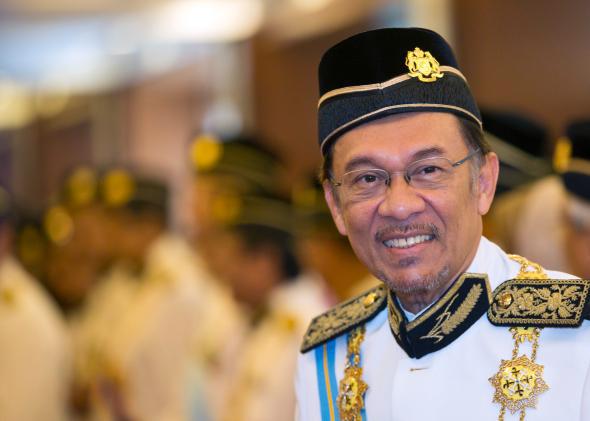There is an axiom in Malaysian politics: Eventually everything comes back to Anwar Ibrahim. So, the longer that the fumbling and inept investigation into the missing Malaysia Airlines Flight 370 has gone on, the more certain it became that it would somehow boomerang to the leader of the country’s democratic opposition.
On Saturday, Prime Minister Najib Razak went before the cameras to declare that officials believe the plane was deliberately diverted and flown in an unknown direction somewhere along a wide arc from Kazakhstan to deep into the Indian Ocean. Now that the search for the Boeing 777 has turned into a criminal investigation, the authorities are taking a close look at the flight’s chief pilot, Zaharie Ahmad Shah, and its first officer, Fariq Abdul Hamid.
They quickly learned—as no doubt all of Shah’s friends knew—that the pilot was a strong supporter of Anwar Ibrahim’s People’s Justice Party. Indeed, Shah is believed to have attended Anwar’s court hearing on March 7 that overturned his 2012 acquittal on sodomy charges, a politically motivated case that the Malaysian government typically dusts off around election time. On Sunday, the U.K. and Malaysian press treated the revelation with the shock you might reserve for damning evidence. Shah was described—by an unnamed source—as a “fanatical supporter of the country’s opposition leader.” Elsewhere, he is described (apparently by unnamed police sources) as “fervent” and “strident” in his political convictions. More than a week after the Boeing 777 disappeared, we lack a motive, a clear suspect, or even a crime scene, but we have our “Anwar Ibrahim connection.” That is Malaysian politics.
A fanatical supporter of Anwar Ibrahim does sound scary—as long as you know nothing about him.
Anwar is the 66-year old opposition leader who is the principal thorn in the side of the United Malays National Organization (UMNO) that has ruled Malaysia for 56 years. Anwar heads a coalition of parties, which includes his own multiethnic party, that has made the greatest inroads against the country’s corrupt masters. In 2008, the opposition won more than a third of the seats in parliament—the first time that UMNO lost its supermajority that allowed it to change the constitution at the prime minister’s whim. Anwar, who had been a political prisoner for six years, most of it in solitary confinement, won his seat in a landslide, and the opposition won five of the country’s 13 state governments. Last year, his opposition party claimed to have won the election against the ruling party, a contest that many say was marred by widespread fraud. Anwar supported the massive protests that followed the ruling party’s supposed victory, but he never called for a toppling of the government.
Anwar is trying to defeat Malaysia’s authoritarian regime through elections—not terrorism, let alone revolution. So, to be clear, what we know is that the pilot of MH370 is a fanatical supporter of a nonviolent man who supports a pluralistic and democratic Malaysia.
Of course, we don’t know Shah’s precise state of mind, and it is true that hours before the flight, his political hero had just been dealt bad news with the court’s decision to overturn his previous acquittal. But this is not news that Anwar or his close supporters would have found shocking. On several occasions I have interviewed Anwar, most recently at his home in 2011, he was always forced to operate under the threat of these politically trumped-up charges that he viewed as nothing more than a weak effort to discredit him. Indeed, few Malaysians view the government’s accusations as anything other than evidence of crooked politics, and Anwar has only become more popular and UMNO’s rule more brittle.
But, if we are engaging in wild theories—and why not, this is Malaysian politics—then why would unnamed police sources be playing up the pilot’s political beliefs a week after we are no closer to knowing the truth about MH370? Because the Malaysian authorities’ performance during this investigation is a pretty reasonable approximation of what passes for governance in a corrupt, nepotistic regime that long ago lost any purpose besides accumulating wealth and extending its own power. Malaysia has fallen behind its Southeast Asian competitors economically in large part because of its stunted political culture. Acting transportation minister Hishammuddin Hussein’s defensive press conferences and updates, which range from opaque to contradictory, are what you’d expect from government ministers who are seldom expected to answer questions.
So, is it possible that Shah hijacked the Malaysia Airlines flight in some twisted form of protest against the government? Of course—even if it seems a less likely explanation than the half dozen other theories that are being floated. Because, whatever happened on board Flight 370, Shah’s support of Anwar Ibrahim is the one piece of evidence that suggests he had a firm grip on reality, not that he was trying to escape it.
Read the rest of Slate’s coverage of Malaysia Airlines Flight 370.
